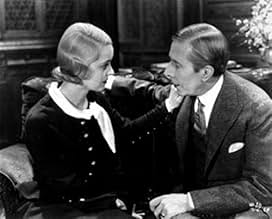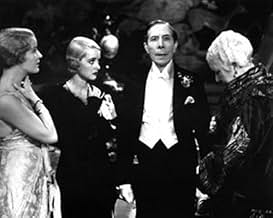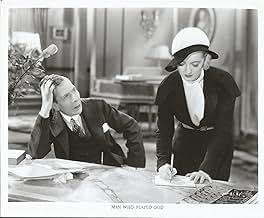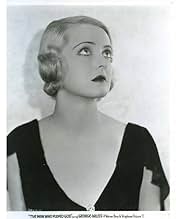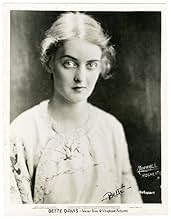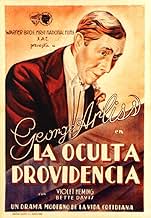IMDb RATING
6.8/10
1.4K
YOUR RATING
After losing his hearing, a musician uses lip-reading to help others.After losing his hearing, a musician uses lip-reading to help others.After losing his hearing, a musician uses lip-reading to help others.
- Awards
- 1 win total
George Arliss
- Montgomery Royle
- (as Mr. George Arliss)
André Luguet
- The King
- (as Andre Luguet)
Ivan F. Simpson
- Battle
- (as Ivan Simpson)
Charles E. Evans
- The Doctor
- (as Charles Evans)
Fred Howard
- Man
- (scenes deleted)
Symona Boniface
- Woman in Audience
- (uncredited)
Wade Boteler
- Detective
- (uncredited)
Elspeth Dudgeon
- Would-Be Ticket Buyer
- (uncredited)
Grace Durkin
- Kit - First Girl
- (uncredited)
Helena Phillips Evans
- Music Fan with Boy
- (uncredited)
6.81.3K
1
2
3
4
5
6
7
8
9
10
Featured reviews
Central Park benefactor
Although George Arliss made several of the roles he did on stage into films both sound and silent The Man Who Played God was not one of them. Another stage legend Otis Skinner originated that role on Broadway although Arliss filmed it twice both as a silent and with sound.
We can only speculate about what Skinner did with the part, but Arliss because we have him on film can truly be said to make the part his own. His is a style that many find old fashioned, but I find most compelling when he's performing.
The story is that of a famous concert pianist who was born into a wealthy family so he's never in danger of missing a meal. A bomb set off at a private performance has left him stone deaf and in a great deal of despair. But he learns the art of lip reading and from his Central Park penthouse with opera glasses in hand spies on a lot of ordinary people and becomes their anonymous benefactor.
Bette Davis made her Warner Brothers debut and the first of two films with George Arliss. Davis who was not exactly shy about criticizing her colleagues had nothing but praise for this man. She credited him with being the first to realize the potential she had as an actress. She plays a student of his who mistakes romantic love for an admiration as an artist she feels. She's not given much to work with in the role, but she does far more than could be expected.
Louise Closser Hale as Arliss's sister and Ivan Simpson as his butler who has a wonderful scene preventing Arliss from suicide also stand out. Look also for Ray Milland in a small part as another man on the verge of suicide.
The Man Who Played God is old fashioned in its presentation, but still holds up well after 80 years.
We can only speculate about what Skinner did with the part, but Arliss because we have him on film can truly be said to make the part his own. His is a style that many find old fashioned, but I find most compelling when he's performing.
The story is that of a famous concert pianist who was born into a wealthy family so he's never in danger of missing a meal. A bomb set off at a private performance has left him stone deaf and in a great deal of despair. But he learns the art of lip reading and from his Central Park penthouse with opera glasses in hand spies on a lot of ordinary people and becomes their anonymous benefactor.
Bette Davis made her Warner Brothers debut and the first of two films with George Arliss. Davis who was not exactly shy about criticizing her colleagues had nothing but praise for this man. She credited him with being the first to realize the potential she had as an actress. She plays a student of his who mistakes romantic love for an admiration as an artist she feels. She's not given much to work with in the role, but she does far more than could be expected.
Louise Closser Hale as Arliss's sister and Ivan Simpson as his butler who has a wonderful scene preventing Arliss from suicide also stand out. Look also for Ray Milland in a small part as another man on the verge of suicide.
The Man Who Played God is old fashioned in its presentation, but still holds up well after 80 years.
The Sound of Silence
THE MAN WHO PLAYED GOD (Warner Brothers, 1932), directed by John G. Adolfi, from a short story by Gouverneur Morris, stars Academy Award winning actor of 1929s DISRAELI, Mr. George Arliss, in a remake to his 1922 silent screen adaptation. Essentially a showcase for the prestigious Arliss in what might have been just another movie assignment to his credit, it's best known as the motion picture responsible for the advancement of Bette Davis in her first important screen role, following her start at Universal in 1931, thus the beginning of her long association at the Warner studio where she would become its major star attraction before the end of the decade.
Of the George Arliss films in circulation and video today, THE MAN WHO PLAYED GOD holds up remarkably well mainly due to its theme and timely message that never really grows out of date, overlooking the fact that such a story echoes passages from the Holy Bible ("A man who has never suffered has never lived," "If you kill yourself, you'll suffer ten thousand times more" or the age old question, "If God is so merciful, how could he allow this to happen to me?") preached during Sunday services. The title has nothing to do with a actor starring in a religious play, but in fact, about a man whose life becomes an "empty shell" only to change from being a troubled soul after losing his hearing to forgetting his bitterness by helping others. While much of the Arliss movies produced at Warners during the early 1930s were extremely popular, most consist of too much dialog and lack of motion to stir up interest. THE MAN WHO PLAYED GOD is one of those few that doesn't fall into that category thanks to its fine direction, screenplay and supporting players.
The story opens in Paris where 50-year-old Montgomery Royal (George Arliss), a concert pianist, engaged to his protégé, Grace Blaine (Bette Davis), a girl more than half his age, agrees to give a private backstage recital for a monarch. During a performance, an anarchist, intending to assassinate the King (Andre Luguet), explodes a bomb. While everyone has escaped injury, Monty becomes stone deaf. Monte returns to his New York City apartment where he finds it difficult to adjust to his world of silence. He becomes bitter, hating God to a point of canceling his order for an organ he was going to donate to a church in memory of his deaf and religious mother, Margaret Ruth Royal. Without the ability to hear what's precious to him, his music, and becomes an embittered recluse. Coming to the point of suicide by nearly jumping from the window, his loyal butler Battle (Ivan Simpson) saves him in time from eternal suffering by offering him something to occupy his time. Having been taught lip reading, he takes binoculars to spy on people across the street in Central Park, reads their lips, learning of their troubles, and becoming a sort of guardian angel in helping those in desperate need without revealing himself. Finding he now has a purpose in life, he must face another greater challenge involving the loyalty of young Grace.
The supporting cast consists Donald Cook as Harold Van Adam; Louise Closser Hale as Monty's sister, Florence; Oscar Apfel as the Lip Reading Teacher; Paul Porcasi as the Concert Manager; with Hedda Hopper, Murray Kinnell and the unbilled Ray Milland. Of the supporting players, second billed Violet Heming appears to be the least familiar, yet in a role that nearly surpasses the one given by Bette Davis. Her sophisticated mannerisms come close to that of the better known Verree Teasdale, as a widow who secretly loves Monty, in spite of his engagement to another. The Bette Davis trademark is not too much evident at this point, in fact, having the make-up department giving Davis the Constance Bennett manner. Davis would be paired with Arliss one more time in the rarely seen comedy, THE WORKING MAN (1933).
In the midst of horror melodramas, gangsters and pre-code sex dramas playing in theaters at the height of the great depression, THE MAN WHO PLAYED GOD comes as a sort of inspirational drama that offers hope to those who have given up on life, with the moral of the story being, "The Lord works in mysterious ways." Remade by Warners as SINCERELY YOURS (1955) with TV personality Liberace in the role originated by Arliss, whose piano playing served him better than his acting, the latest screen adaptation, that should have improved over the old, didn't, making this 1932 version the one worth viewing. THE MAN WHO PLAYED GOD, which has never been distributed to video cassette or DVD, can be seen on Turner Classic Movies. (***)
Of the George Arliss films in circulation and video today, THE MAN WHO PLAYED GOD holds up remarkably well mainly due to its theme and timely message that never really grows out of date, overlooking the fact that such a story echoes passages from the Holy Bible ("A man who has never suffered has never lived," "If you kill yourself, you'll suffer ten thousand times more" or the age old question, "If God is so merciful, how could he allow this to happen to me?") preached during Sunday services. The title has nothing to do with a actor starring in a religious play, but in fact, about a man whose life becomes an "empty shell" only to change from being a troubled soul after losing his hearing to forgetting his bitterness by helping others. While much of the Arliss movies produced at Warners during the early 1930s were extremely popular, most consist of too much dialog and lack of motion to stir up interest. THE MAN WHO PLAYED GOD is one of those few that doesn't fall into that category thanks to its fine direction, screenplay and supporting players.
The story opens in Paris where 50-year-old Montgomery Royal (George Arliss), a concert pianist, engaged to his protégé, Grace Blaine (Bette Davis), a girl more than half his age, agrees to give a private backstage recital for a monarch. During a performance, an anarchist, intending to assassinate the King (Andre Luguet), explodes a bomb. While everyone has escaped injury, Monty becomes stone deaf. Monte returns to his New York City apartment where he finds it difficult to adjust to his world of silence. He becomes bitter, hating God to a point of canceling his order for an organ he was going to donate to a church in memory of his deaf and religious mother, Margaret Ruth Royal. Without the ability to hear what's precious to him, his music, and becomes an embittered recluse. Coming to the point of suicide by nearly jumping from the window, his loyal butler Battle (Ivan Simpson) saves him in time from eternal suffering by offering him something to occupy his time. Having been taught lip reading, he takes binoculars to spy on people across the street in Central Park, reads their lips, learning of their troubles, and becoming a sort of guardian angel in helping those in desperate need without revealing himself. Finding he now has a purpose in life, he must face another greater challenge involving the loyalty of young Grace.
The supporting cast consists Donald Cook as Harold Van Adam; Louise Closser Hale as Monty's sister, Florence; Oscar Apfel as the Lip Reading Teacher; Paul Porcasi as the Concert Manager; with Hedda Hopper, Murray Kinnell and the unbilled Ray Milland. Of the supporting players, second billed Violet Heming appears to be the least familiar, yet in a role that nearly surpasses the one given by Bette Davis. Her sophisticated mannerisms come close to that of the better known Verree Teasdale, as a widow who secretly loves Monty, in spite of his engagement to another. The Bette Davis trademark is not too much evident at this point, in fact, having the make-up department giving Davis the Constance Bennett manner. Davis would be paired with Arliss one more time in the rarely seen comedy, THE WORKING MAN (1933).
In the midst of horror melodramas, gangsters and pre-code sex dramas playing in theaters at the height of the great depression, THE MAN WHO PLAYED GOD comes as a sort of inspirational drama that offers hope to those who have given up on life, with the moral of the story being, "The Lord works in mysterious ways." Remade by Warners as SINCERELY YOURS (1955) with TV personality Liberace in the role originated by Arliss, whose piano playing served him better than his acting, the latest screen adaptation, that should have improved over the old, didn't, making this 1932 version the one worth viewing. THE MAN WHO PLAYED GOD, which has never been distributed to video cassette or DVD, can be seen on Turner Classic Movies. (***)
A lot more going on here besides Bette Davis
First and foremost, "The Man Who Played God" (1932) is not a Bette Davis vehicle. She was still a few years away from receiving top billing and graduating into 'A' pictures. However, the mere fact that she's in this overlooked and forgotten film will only push it into wider circulation and rapidly increase its number of viewers. So much has already been said about her, there's very little one can add to further compliment her. Personally, I think she gave some of her best performances in these early 1930s B programmers for Warner Bros. Sure, the material wasn't nearly as good, which only made her performances stand out all the more. But Bette Davis has little to do with what stands out about this movie.
After losing his hearing, a well-loved and respected piano player (George Arliss) becomes a recluse. He rejects most of his old friends and companions, and is cruel to the few he does see. He learns to read lips, but grows more and more depressed at the same time. And finally when he has hit rock bottom, he finds a purpose in his life,... philanthropy. Putting aside his own problems and selfishness, his salvation comes from helping others. This is a theme that would recur over and over again to varying degrees in the Depression era 30s (especially in Frank Capra's movies).
The other thing of interest here is the act of voyeurism. Through the aid of binoculars, he's able to read lips, and essentially, spy on everyday New Yorker's. One can't help but wonder if this little movie may have had some influence or have been the basis for the idea of Cornell Woolrich's short story "It Had to Be Murder", which would be eventually adapted into Alfred Hitchcock's "Rear Window" (1954).
This movie, is, by no means a masterpiece, but its still an important one. With so many interesting ideas going on here, its well worth the watch.
After losing his hearing, a well-loved and respected piano player (George Arliss) becomes a recluse. He rejects most of his old friends and companions, and is cruel to the few he does see. He learns to read lips, but grows more and more depressed at the same time. And finally when he has hit rock bottom, he finds a purpose in his life,... philanthropy. Putting aside his own problems and selfishness, his salvation comes from helping others. This is a theme that would recur over and over again to varying degrees in the Depression era 30s (especially in Frank Capra's movies).
The other thing of interest here is the act of voyeurism. Through the aid of binoculars, he's able to read lips, and essentially, spy on everyday New Yorker's. One can't help but wonder if this little movie may have had some influence or have been the basis for the idea of Cornell Woolrich's short story "It Had to Be Murder", which would be eventually adapted into Alfred Hitchcock's "Rear Window" (1954).
This movie, is, by no means a masterpiece, but its still an important one. With so many interesting ideas going on here, its well worth the watch.
Mr. George Arliss Gives Another Acting Lesson
An aging & celebrated concert pianist completely loses his hearing, and with it his faith in The Almighty. After learning to lip read, he realizes he can once again enter into people's lives, alleviating the misfortunes of total strangers. With this much power to do good, he becomes THE MAN WHO PLAYED GOD.
Although sadly neglected today, George Arliss was one of the very greatest of film actors of the 1930's. His art was consummate - a whole volume of emotion could be conveyed by the slightest movement of face or posture. He gives a wonderful performance here as a man torn from what he loves the most, blaming God for it and eventually finding peace.
A splendid actress of the same period, Louise Closser Hale gives quiet dignity to the role of Arliss' sister. As his protégé, young Bette Davis does a fine job; she always considered this to be her first film role of substance. Ivan F. Simpson is excellent as a very loyal butler. Hedda Hopper has a tiny role as a woman at a picnic & look for an uncredited Ray Milland as a young man in Central Park attempting suicide.
Although sadly neglected today, George Arliss was one of the very greatest of film actors of the 1930's. His art was consummate - a whole volume of emotion could be conveyed by the slightest movement of face or posture. He gives a wonderful performance here as a man torn from what he loves the most, blaming God for it and eventually finding peace.
A splendid actress of the same period, Louise Closser Hale gives quiet dignity to the role of Arliss' sister. As his protégé, young Bette Davis does a fine job; she always considered this to be her first film role of substance. Ivan F. Simpson is excellent as a very loyal butler. Hedda Hopper has a tiny role as a woman at a picnic & look for an uncredited Ray Milland as a young man in Central Park attempting suicide.
A unique premise plus the talent of Arliss and Bette Davis
This is an unusual little film starring George Arliss as master concert musician Monty Royale whose young pupil Grace (Bette Davis) confesses her love to him. He's of course flattered but unsure of what the coming years will bring considering their age difference. He agrees to marry her if she feels the same in six months. However, near the beginning of the six month period something happens that leaves Monty unable to enjoy his own music - he is left completely deaf from an explosion. He becomes a bitter man who shuts himself away from everyone. He does take some training in learning to read lips so that he can deal with the world in his new condition, and this training leads him to realize that he now has the means to bring happiness to people in a different and more individualized way than he could as a musician. With the aid of some powerful binoculars left behind by Grace, he can read the lips of the people in the park across the street, learn their troubles, and with his large family fortune and influence, save lives or maybe just bring someone some welcome happiness.
Soon the joy of living has reentered Monty's life, and he is happy that the six month waiting period is soon to end and Grace will be returning from California - they can be wed. He's people watching at his window when Grace suddenly appears in the park across the street. She sits down with someone and begins to have a conversation. Monty "listens in". What will he discover and how will he react? Watch and find out.
In addition to the fine work of George Arliss and Bette Davis, the supporting roles are well played here too. Ivan Simpson is great as Monty's gentleman's gentleman who has no trouble sternly lecturing his master when he needs it, yet is such a formal person that he cannot leave the house -even on an urgent errand - without his hat, and there is even a very small part played by a very young Ray Milland. Highly recommended for fans of early 30's films. It has some precode elements in it, particularly the part where Monty is wrestling with God and his loss of belief, but I would not call it a precode at all.
Soon the joy of living has reentered Monty's life, and he is happy that the six month waiting period is soon to end and Grace will be returning from California - they can be wed. He's people watching at his window when Grace suddenly appears in the park across the street. She sits down with someone and begins to have a conversation. Monty "listens in". What will he discover and how will he react? Watch and find out.
In addition to the fine work of George Arliss and Bette Davis, the supporting roles are well played here too. Ivan Simpson is great as Monty's gentleman's gentleman who has no trouble sternly lecturing his master when he needs it, yet is such a formal person that he cannot leave the house -even on an urgent errand - without his hat, and there is even a very small part played by a very young Ray Milland. Highly recommended for fans of early 30's films. It has some precode elements in it, particularly the part where Monty is wrestling with God and his loss of belief, but I would not call it a precode at all.
Did you know
- TriviaThis was the first movie Bette Davis made under her contract to Warner Bros., the studio under which she did most of her best-known work of the 1930s and '40s. Her earlier six films were made for various studios, (including Universal, RKO and Columbia) all of which let her go.
- GoofsWhen Royle goes to his desk after observing the couple in the park, the shadow of the boom microphone dips onto the window curtain behind him.
- Quotes
Grace Blair: You're my ideal!
Montgomery Royle: I shall always be... your friend.
- ConnectionsFeatured in Hollywood: The Great Stars (1963)
- SoundtracksFantaisie-Impromptu in C sharp minor, Op. 66
(1834) (uncredited)
Written by Frédéric Chopin
Played on piano by George Arliss (dubbed by Salvatore Santaella) at the concert
Details
- Release date
- Country of origin
- Languages
- Also known as
- Covek koji se dopao Bogu
- Filming locations
- Production company
- See more company credits at IMDbPro
Box office
- Budget
- $237,000 (estimated)
- Runtime
- 1h 20m(80 min)
- Color
- Sound mix
- Aspect ratio
- 1.37 : 1
Contribute to this page
Suggest an edit or add missing content

